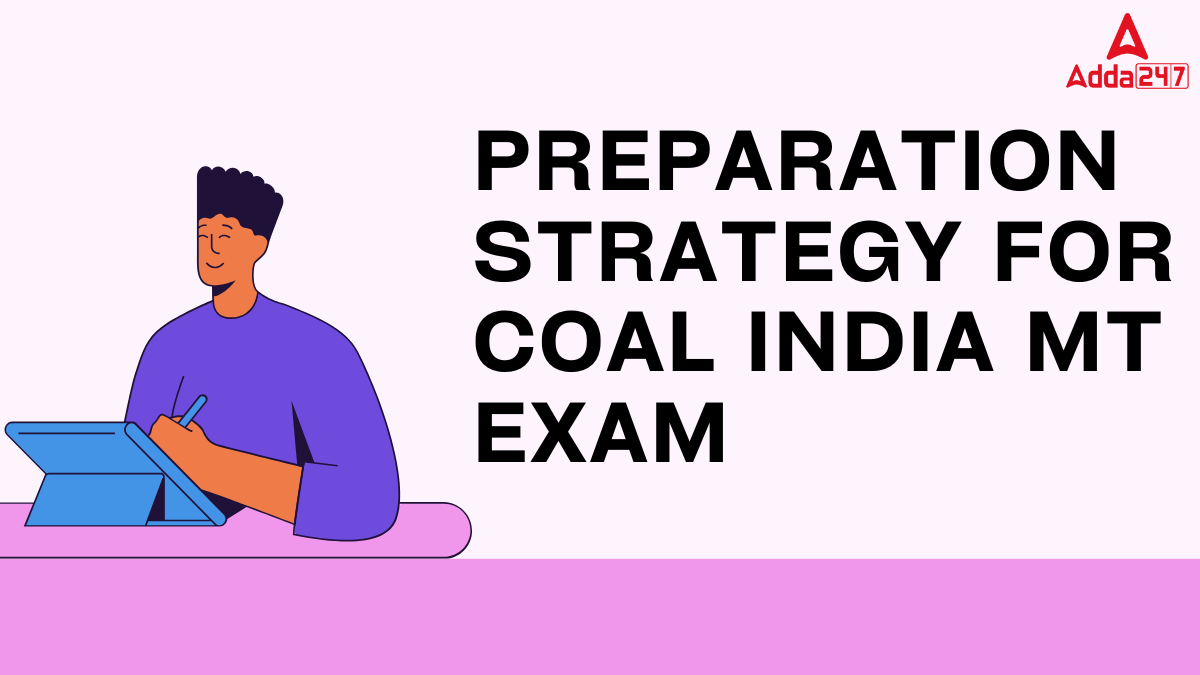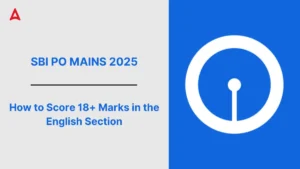Table of Contents
Are you preparing for the Coal India Management Trainee (MT) Exam? This exam is a great opportunity to start a rewarding career in one of India’s largest organizations. However, with thousands of candidates competing in the exam, proper preparation is key to success. In this article, we will share with you some simple and effective strategies to help you crack the exam. From understanding the exam pattern to tips for each section, we’ve got you covered. Let’s get going on your journey to becoming a Coal India MT.
Preparation Strategy for Coal India MT Exam
The Coal India MT 2025 Exam is one of the most prestigious exams conducted by the Coal India Limited. This exam is conducted by them to recruit candidates for the post of Management Trainee (MT). This exam assesses a candidate’s different areas of General knowledge, Numerical abilities, Reasoning and English and Professional knowledge.
The Coal India MT Exam consists of an online written test, which is divided into two papers:
- Paper 1 – General Awareness, Reasoning, Numerical Ability, and English Language
- Paper 2 – Professional Knowledge
To score well in all these sections, you must follow a structured preparation plan. Below are effective strategies for each section:
Understand the Exam Pattern and Syllabus
Understanding the exam pattern is the first step in preparation. You should carefully go through the official syllabus and analyze previous year question papers to identify frequently asked topics. Paper 1 tests more general aptitude about different subjects, while Paper 2 is technical and requires in-depth knowledge of the candidate’s engineering discipline. Creating a structured timetable that covers all subjects equally is important. Try to aim to complete the syllabus at least one month before the exam, leaving sufficient time for revision and allowing you to focus more on mock tests.
General Awareness
The general awareness section requires consistent reading and revision. Staying updated with national and international news is essential, especially regarding topics related to Coal India, energy policies, government regulations, and environmental concerns. Attending Daily Current Affairs sessions and reading newspapers like The Hindu or The Indian Express, along with monthly current affairs magazines, can be beneficial. Static GK topics such as geography, history, economics, and major government schemes should also be covered. You should maintain a notebook for noting important events, which will help in quick revision before the exam. Regularly attempt daily quizzes and mock tests to improve retention and accuracy.
Reasoning
The reasoning section tests your logical and analytical thinking ability. It includes topics like seating arrangement, puzzles, coding-decoding, syllogisms, and logical deductions. You should start by understanding the basic concepts of each topic and then move on to timed practice sessions. Since puzzles and seating arrangements can be time-consuming, it is advisable to practice different patterns daily to build speed. Learn shortcut techniques for syllogisms and logical deductions to save time in the exam. Practising with previous year question papers and sectional mock tests will help in identifying weak areas and improving overall accuracy.
Numerical Ability
This section requires a strong understanding of basic mathematical concepts. Important topics include percentages, profit and loss, simple interest and compound interest, time and work, ratios, number series, and probability. You should focus on clearing their concepts first and then move on to problem-solving. Practising calculations using shortcut techniques will improve your overall speed. Regularly solve a variety of questions including online practice sets and mock tests to build more confidence. Time management is crucial, as lengthy calculations can slow down the overall performance. Learn shortcut tricks and techniques and practice mental calculations to get better at solving problems faster.
English Language
The English section tests grammar, vocabulary, and comprehension skills. You should focus on improving their understanding of sentence structure, parts of speech, and commonly used idioms and phrases. Read newspapers and editorials daily to enhance reading comprehension skills and vocabulary. Solving practice exercises on topics like error detection, fill-in-the-blanks, and sentence rearrangement will improve your accuracy. Attempt mock tests and analyze mistakes to strengthen weak areas. You should also focus on commonly asked questions in previous years exams to get an idea of the pattern and difficulty level.
Professional Knowledge (Paper 2 – Technical Section)
This section is the most crucial part of the exam as it carries significant weight. You should start by revising fundamental concepts from your undergraduate syllabus. Standard textbooks and reference materials used in college should be the primary source of study. Topics such as thermodynamics, circuit theory, soil mechanics, and mining methods vary depending on your specialization and must be thoroughly covered. Numerical-based questions are common in this section, so practising calculations and shortcuts is essential. Creating short notes for important formulas, definitions, and key points can help during revision. Solving previous year papers and subject-wise mock tests is highly recommended to you to understand question patterns and improve accuracy.
Practice with Mock Tests and Previous Year Papers
Mock tests play a crucial role in exam preparation. They help in understanding the difficulty level, managing time efficiently, and identifying weak areas. You should attempt full-length mock tests regularly in the last few weeks before the exam to build exam confidence. After each test, analyzing your performance and noting down your mistakes is important for improvement. Solving previous year question papers gives insight into important topics and frequently asked questions. You should set a target score for each test and work on gradually improving their performance.
Time Management Tips
Effective time management is key to scoring well in the exam. You should allocate fixed time for each subject based on your strengths and weaknesses. Practising mock tests under timed conditions will help you manage speed during the actual exam. Difficult topics should be tackled first to ensure ample time for revision later. Creating a weekly and monthly study plan will help you cover all topics systematically. It is also essential to take short breaks between study sessions to maintain concentration and avoid burnout.
Preparation Tips for the Interview of Coal India MT Exam
The interview round for the Coal India MT Exam is crucial, as it assesses not just technical knowledge but also communication skills, confidence, and overall personality. You must be well-prepared to answer both technical and HR-based questions. Below are some essential tips to excel in the interview.
Understand the Company and Industry
Before appearing for the interview, research “Coal India Limited (CIL)” and its operations, recent developments, and industry trends. Understanding CIL’s role in the energy sector, mining policies, environmental regulations, and major government initiatives related to coal production will help you answer industry-related questions. Being aware of the company’s annual reports, financial performance, and future projects can leave a good impression on the interview panel.
Revise Core Technical Concepts
Since this is a “Management Trainee (MT) interview”, you can expect technical questions related to your engineering discipline. Revising core subjects and frequently asked technical questions is important. You should focus on practical applications of concepts rather than just theoretical knowledge. Preparing short, precise explanations for key technical topics will help you answer confidently. If you do not know the answer to a question, you should acknowledge it honestly rather than guessing.
Prepare for Common Questions
Apart from technical knowledge, the interview panel will assess your communication skills, leadership abilities, and problem-solving mindset. Some common questions include:
- Tell us about yourself.
- Why do you want to join Coal India Limited?
- What are your strengths and weaknesses?
- Where do you see yourself in five years?
- How do you handle pressure and deadlines?
You should prepare well-structured, honest, and concise answers to these questions. It is important to highlight leadership skills, teamwork experiences, and problem-solving abilities using real-life examples.
Improve Communication and Confidence
A candidate’s body language, confidence, and clarity of speech play a crucial role in making a good impression. Speaking in a clear and professional manner while maintaining eye contact shows confidence. Practising mock interviews with friends or mentors can help you in improving communication skills. You should also focus on maintaining a calm and composed attitude, even when you are faced with difficult questions.
Be Honest and Professional
If you do not know the answer to a question, it is better to politely admit it rather than provide incorrect or misleading information. Interviewers appreciate honesty and a willingness to learn. Dressing in formal attire, arriving on time, and maintaining professional etiquette are also essential aspects of interview preparation.
Stay Updated on Current Affairs
You should be well informed about current affairs, government policies, and coal industry developments. Questions related to environmental concerns, sustainable mining practices, and India’s energy sector policies are commonly asked. Being able to discuss these topics confidently will showcase your awareness and preparedness.
Mock Interviews and Self-Assessment
Practicing mock interviews helps you identify weak areas and improve overall performance. Recording self-introduction responses, practising in front of a mirror, or seeking feedback from mentors can help you refine your answers. Reviewing common interview questions and rehearsing structured responses will reduce your nervousness and improve fluency.
| Related Article | |
| CIL Management Trainee Salary 2025 | CIL Management Trainee Previous Year Papers |
| CIL MT Syllabus 2025 | CIL MT Cut Off 2025 |




 How to Score 18+ Marks in the English La...
How to Score 18+ Marks in the English La...
 30 Days Study Plan to Crack SBI Clerk 20...
30 Days Study Plan to Crack SBI Clerk 20...
 SBI Clerk Mains Exam Preparation Tips 20...
SBI Clerk Mains Exam Preparation Tips 20...





